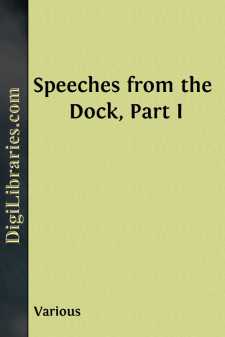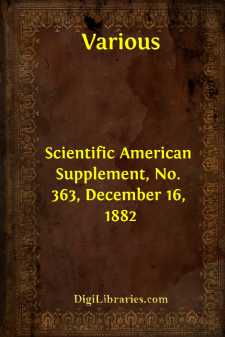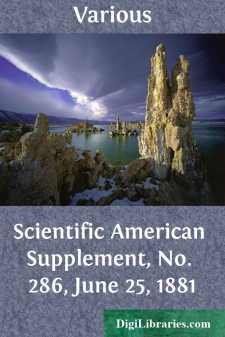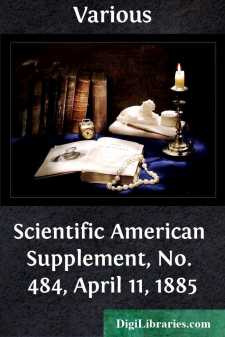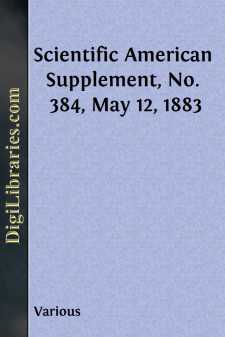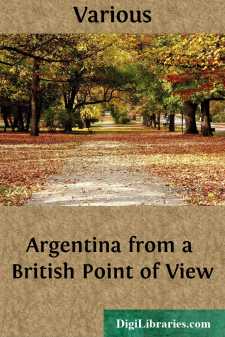Categories
- Antiques & Collectibles 13
- Architecture 36
- Art 48
- Bibles 22
- Biography & Autobiography 813
- Body, Mind & Spirit 141
- Business & Economics 28
- Children's Books 12
- Children's Fiction 9
- Computers 4
- Cooking 94
- Crafts & Hobbies 4
- Drama 346
- Education 46
- Family & Relationships 57
- Fiction 11826
- Games 19
- Gardening 17
- Health & Fitness 34
- History 1377
- House & Home 1
- Humor 147
- Juvenile Fiction 1873
- Juvenile Nonfiction 202
- Language Arts & Disciplines 88
- Law 16
- Literary Collections 686
- Literary Criticism 179
- Mathematics 13
- Medical 41
- Music 40
- Nature 179
- Non-Classifiable 1768
- Performing Arts 7
- Periodicals 1453
- Philosophy 64
- Photography 2
- Poetry 896
- Political Science 203
- Psychology 42
- Reference 154
- Religion 513
- Science 126
- Self-Help 83
- Social Science 81
- Sports & Recreation 34
- Study Aids 3
- Technology & Engineering 59
- Transportation 23
- Travel 463
- True Crime 29
Speeches from the Dock, Part I
by: Various
Categories:
Description:
Excerpt
INTRODUCTORY
To the lovers of Ireland—to those who sympathize with her sufferings and resent her wrongs, there can be few things more interesting than the history of the struggles which sprang from devotion to her cause, and were consecrated by the blood of her patriots. The efforts of the Irish race to burst the fetters that foreign force and native dissensions imposed on them, and elevate their country from bondage and degradation to a place amongst free nations, fill a page in the world's history which no lover of freedom can read without emotion, and which must excite wonder, admiration, and regret in the mind of every man with whom patriotism is not a reproach, and who can sympathize with a cause ennobled by fidelity and sacrifice, and sanctified by the blood and tears of a nation. "How hands so vile could conquer hearts so brave," is the question which our National Poet supposes to arise in the mind of the stranger, as he looks on the spectacle of Ireland in her decay; but another question will suggest itself to those who study the history of our country: it is, how a feeling so deeply rooted as the love of independence is in the hearts of the Irish people—an aspiration so warmly and so widely entertained—which has been clung to with so much persistency—which has survived through centuries of persecution—for which generations have arisen, and fought, and bled, and dashed themselves against the power of England with a succession as unbroken as that of the waves upon our shores—a cause so universally loved, so deeply reverenced, and so unflinchingly supported by a brave and intrepid race, should never have attained the blessing of success. A more signal instance than that which Ireland can supply of the baffling of a nation's hope, the prolonged frustration of a people's will, is not on record; and few even of those who most condemn the errors and weakness by which Irishmen themselves have retarded the national object, will hesitate to say that they have given to mankind the noblest proof they possess of the vitality of the principles of freedom, and the indestructibility of national sentiment.
It is for us, however, Irish of the Irish, that the history of the struggle for Ireland's rights possesses most attractions. We live amidst the scenes where the battles against the stranger were fought, and where the men who waged them lived and died. The bones of the patriots who laboured for Ireland, and of those who died for her, repose in the graveyards around us; and we have still amongst us the inheritors of their blood, their name, and their spirit. It was to make us free—to render independent and prosperous the nation to, which we belong—that the pike was lifted and the green flag raised; and it was in furtherance of this object, on which the hearts of Irishmen are still set, that the men whose names shine through the pages on which the story of Ireland's struggles for national existence is written, suffered and died. To follow out that mournful but absorbing story is not, however, the object aimed at in the following pages. The history of Ireland is no longer a sealed volume to the people; more than one author has told it truthfully and well, and the list of books devoted to it is every day receiving valuable accessions. Nor has it even been attempted, in this little work, though trenching more closely on its subject, to trace the career and sketch the lives of the men who fill the foremost places in the ranks of Ireland's political martyrs. In the subjoined pages little more will be found than a correct report of the addresses delivered, under certain peculiar circumstances, by the group of Irishmen whose names are given on the titlepage. A single public utterance from the lips of each of these gentlemen is all that we have printed, though it would be easy to supplement them in nearly every case by writings and speeches owning a similar authorship, equally eloquent and equally patriotic. But the speeches given here are associated with facts which give them peculiar value and significance, and were spoken under circumstances which lend to them a solemn interest and impressiveness which could not otherwise be obtained. They reach us—these dock speeches, in which nobility of purpose and chivalrous spirit is expressed—like voices from the tomb, like messages from beyond the grave, brimful of lessons of dignity and patriotism. We can see the men who spoke them standing before the representatives of the government whose oppression had driven them to revolt, when the solemn farce of trying them for a crime which posterity will account a virtue had terminated, and when the verdict of "guilty" had gladdened the hearts of their accusers. The circumstances under which they spoke might well cause a bold man to falter. They were about parting for ever from all that makes life dear to man; and, for some of them, the sentence; which was to cut short the thread of their existence, to consign them to a bloody and ignominious death, to leave their bodies mutilated corpses, from which the rights of Christian burial were to be withheld—which was to assign them the death of a dog, and to follow them with persecuting hand into the valley of death—was about to fall from the lips of the judges whom they addressed. Against others a fate less repulsive, perhaps, to the feelings of humanity, but certainly not more merciful, and hardly less painful and appalling, was about to be decreed. Recent revelations have thrown some light on the horrors endured by the Irish political prisoners who languish within the prison pens of England; but it needs far more than a stray letter, a half-stifled cry from the dungeon depths, to enable the public to realize the misery, the wretchedness, and the degradation attached to the condition to which England reduces her political convicts. Condemned to associate with the vilest of the scoundrels bred by the immorality and godlessness of England—exposed, without possibility of redress, to the persecutions of brutal, coarse-minded men, accustomed to deal only with ruffians than whom beasts are less ferocious and unreclaimable—restricted to a course of discipline which blasts the vigour of the body, and under whose influence reason herself totters upon her throne—the Irish rebel against whom the doom of penal servitude has been pronounced is condemned to the most hideous and agonizing punishments to which men of their class could be exposed. It was with such terrors staring them in the face that the men whose words are recorded in this little work delivered their speeches from the dock. It is surely something for us, their countrymen, to boast of, that neither in their bearing nor in their words was there manifested the slightest trace of weakness, the faintest exhibition of any feeling which could show that their hearts were accessible to the terror which their situation was so well calculated to inspire. No cheek grew pale, no eyes lost their light—their tones were unbroken, and their manner undaunted as ever, as these men uttered the words we purpose recording. Their language tells of minds which persecution could not subdue, and for which death itself possessed no sting; and the manner in which it was expressed showed that, in their case, elevation of sentiment was allied with unconquerable firmness and resolution. Never were lessons so noble more boldly preached. It is in courts of justice, after all, declares a great English authority, that the lessons of morality are best taught; and in Ireland the truthfulness of the assertion is established. But it is not from the bench or the jury-box that the words have fallen in which the cause of morality and justice has been vindicated; venality, passion, and prejudice have but too often swayed the decisions of both; and it is to the dock we must turn when we seek for honour, integrity, and patriotism.
We owe it to the men who suffered so unflinchingly in the cause of our country, and who have left us so precious a heritage in the speeches in which they hurled a last defiance at their oppressors, that their names should not be forgotten, or the recollection of their acts suffered to grow cold. The noblest incentive to patriotism, as it is the highest reward which this world can offer those who dare and suffer for fatherland, is the gratitude, the sympathy, and the applause of the people for whom they laboured. We owe it to the brave men whose patriotism is attested in the addresses comprised in this volume, that the memory of their noble deeds shall not pass away, and that their names shall remain enshrined in the hearts of their countrymen. They failed, it is true, to accomplish what they attempted, and the battle to which they devoted themselves has yet to be won; but we know that they, at least, did their part courageously and well; and, looking back now upon the stormy scenes of their labours, and contrasting the effects of their sacrifices with the cost at which they were made, the people of Ireland are still prepared to accept the maxim that—
"Tis better to have fought and lost, Than never to have fought at all."
While such men can be found to suffer as they have suffered for Ireland, the ultimate triumph of her aspirations cannot be doubted, nor can the national faith be despaired of while it has martyrs so numerous and so heroic. It is by example that the great lessons of patriotism can best be conveyed; and if the national spirit burn brightly to-day in Ireland—if the spirit of her children be still defiant and unsubdued—if, at home and in the far West, the hearts of the Irish people still throb with the emotions that prompted Emmet and Wolfe Tone—if their eyes are still hot to see the independence of their country, their arms still ready to strike, and their spirit ready to sacrifice for the accomplishment of that object, we owe the result largely to the men whose names are inscribed in this little work, and whose memory it is intended to perpetuate.
We have commenced our series with the speech of Theobald Wolfe Tone, and our record stretches no further back than the memorable insurrection of 1798. If our object were to group together the Irishmen who are known to have struggled for the independence of their country, and who suffered for their attachment to her cause, we might go much farther back into history, and indefinitely increase the bulk of this publication. We fix the insurrection of '98 as the limit of our collection, chiefly because it was at that time trials for high treason in Ireland assumed the precise meaning and significance which they now possess, and there is consequently, in the speeches which follow, such a unity of purpose and sentiment as renders them especially suitable for presentation in a single volume. Only seventy years have elapsed since Wolfe Tone spoke to the question why sentence should not be pronounced on him—only two-thirds of a century since Emmet vindicated the cause of his country from the Green street dock, and already what a host of imitators and disciples have they had! There is not a country in Europe, there is not a nationality in the world, can produce such another collection as that which we to-day lay before the people of Ireland. We live under a government which claims to be just, liberal, and constitutional, yet against no other government in Christendom have the same number of protests been made within the same space of time. Not Poland, not Hungary, not Venetia, can point to such an unbroken succession of political martyrs. The pages of history contain nothing to compare with the little volume we to-day place in the hands of our countrymen; and we know of no more powerful and eloquent condemnation of the system on which Ireland is governed, than that contained in the simple fact that all those speeches were spoken, all those trials carried-out, all those sentences decreed, within the lifetime of a single generation. It is idle to think of subduing a people who make so many sacrifices, and who are undaunted still; it is vain to think of crushing a spirit which survives so much persecution. The executioner and the gaoler, the gibbet, the block, and the dungeon, have done their work in the crusade against Irish Nationality, and we know what the result is to-day. The words of the last political convict whose name appears in these pages are as uncompromising and as bold as those of the first of his predecessors; and, studying the spirit which they have exhibited, and marking the effect of their conduct on the bulk of their countrymen, it is impossible to avoid the conclusion, that so much persistent resolution and heroism must one day eventuate in success, and that Ireland, the country for which so many brave men have suffered with such unfaltering courage, is not destined to disprove the rule that—
"Freedom's battle once begun,— Bequeath'd from bleeding sire to son— Though baffled oft, is ever won."
No name is more intimately associated with the national movement of 1798 than that of Theobald Wolfe Tone. He was its main-spring, its leading spirit. Many men connected with it possessed, as he did, brilliant talents, unfailing courage and determination, and an intense devotion to the cause; but the order of his genius raised him above them all, and marked him out from the first as the head and front of the patriot party. He was one of the original founders of the Society of United Irishmen, which was formed in Belfast in the year 1791. In its early days this society was simply a sort of reform association, a legal and constitutional body, having for its chief object the removal of the frightful oppressions by which the Catholic people of Ireland were tortured and disgraced; but in the troubled and portentous condition of home and foreign politics, the society could not long retain this character. The futility of seeking a redress of the national grievances by parliamentary means was becoming apparent to every understanding. The system of outrage and injustice towards the Catholics, unabating in its severity, continued to exasperate the actual sufferers and to offend all men of humane feelings and enlightened principles; and, at the same time, the electric influence of the American War of Independence and the French Revolution was operating powerfully in every heart, evoking there the aspiration for Irish freedom, and inspiring a belief in its possible attainment. In the midst of such exciting circumstances the society could not continue to stand on its original basis. In the year 1794, after a debate among the members, followed by the withdrawal of the more moderate or timid among them from its ranks, it assumed the form and character of a secret revolutionary organization; and Tone, Thomas Addis Emmet, Samuel Neilson, Thomas Russell, James Napper Tandy, with a number of other patriotic gentlemen in Belfast, Dublin, and other parts of the country, soon found themselves in the full swing of an insurrectionary movement, plotting and planning for the complete overthrow of British power in Ireland. Thenceforward, for some time, the organization went on rapidly extending through the province of Ulster, in the first instance, and subsequently over most of the midland and southern counties.
Such was the state of affairs when, in the early part of 1794, an emissary from the French government arrived in Ireland, to ascertain to what extent the Irish people were likely to co-operate with France in a war against England. This individual was the Rev. William Jackson, an Irish Protestant clergyman, who had for some years been resident in France, and had become thoroughly imbued with Democratic and Republican principles. Unfortunately, he was not one of the most prudent of envoys. He revealed his mission to an acquaintance of his, an English attorney, named Cockayne, who repaid his confidence by betraying his secrets to the government....


